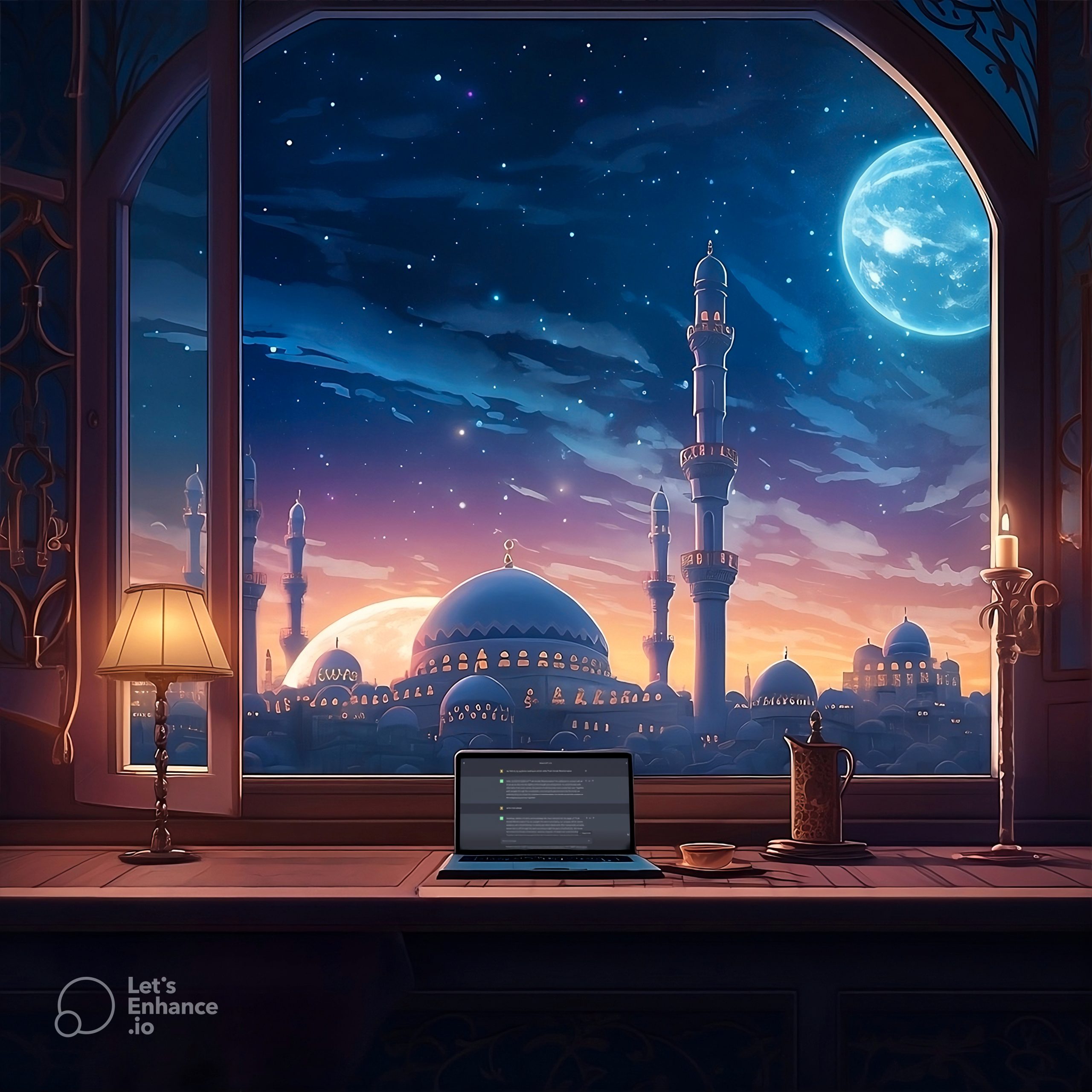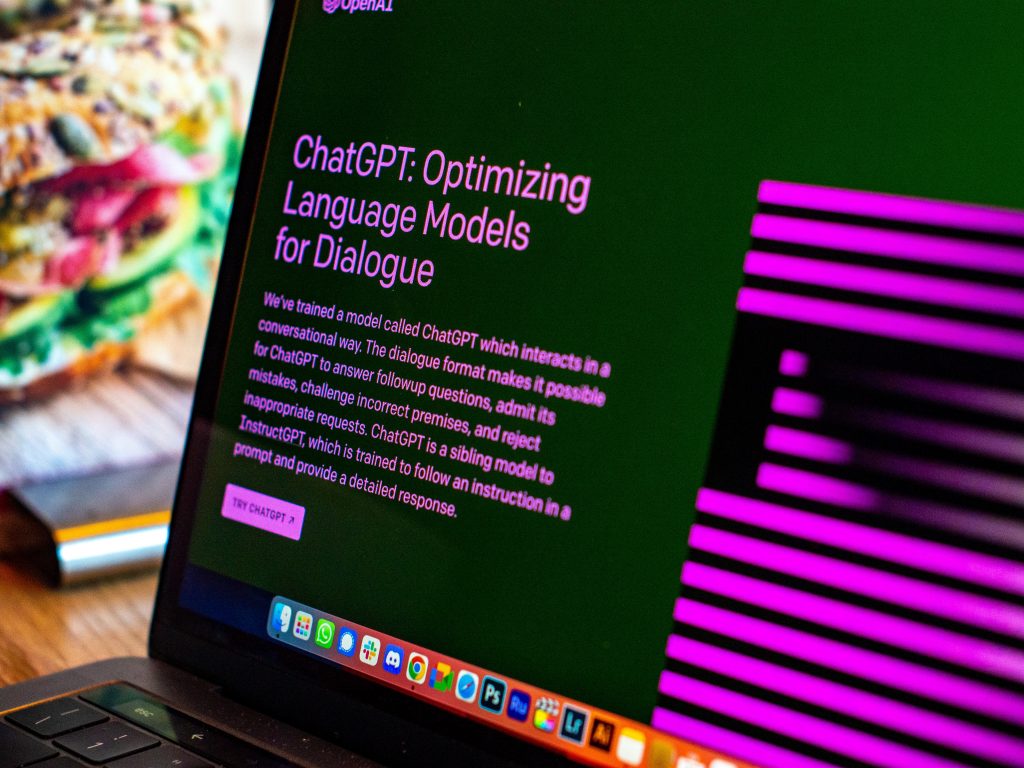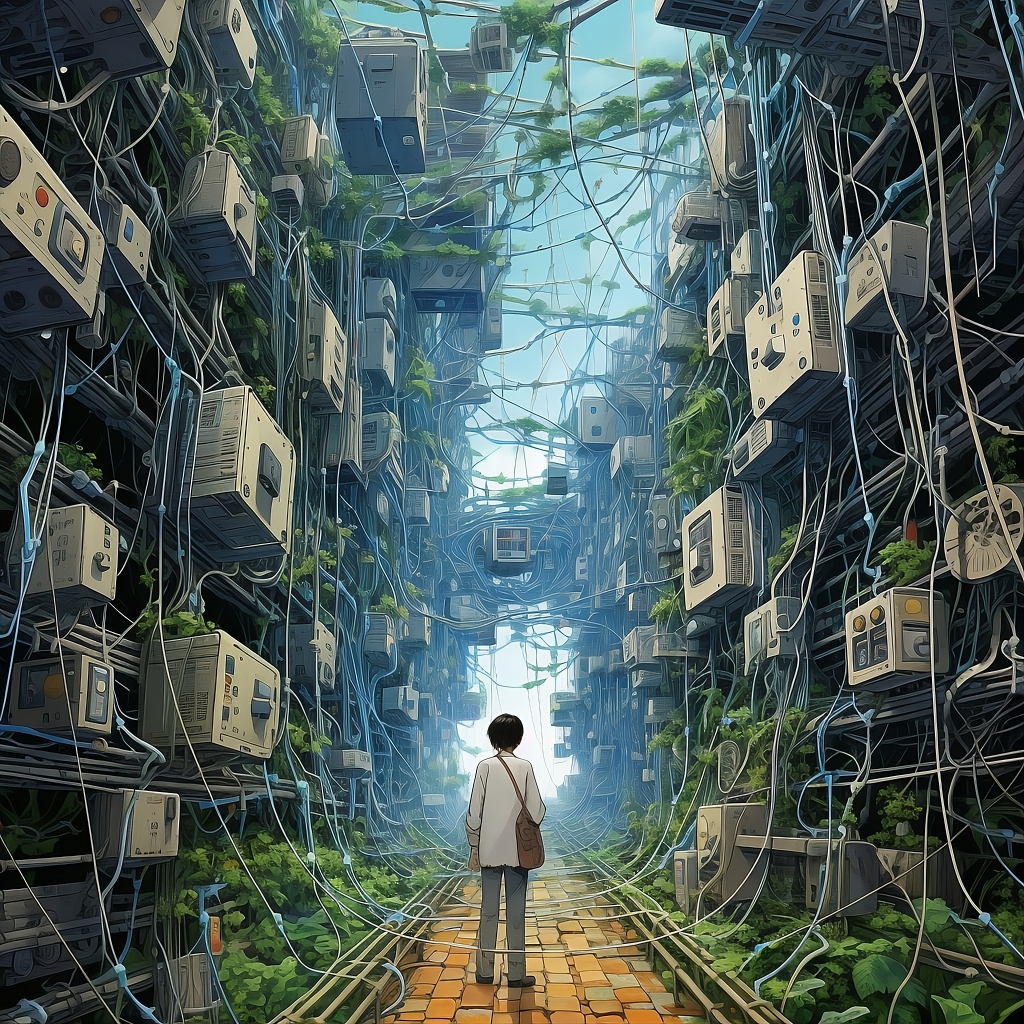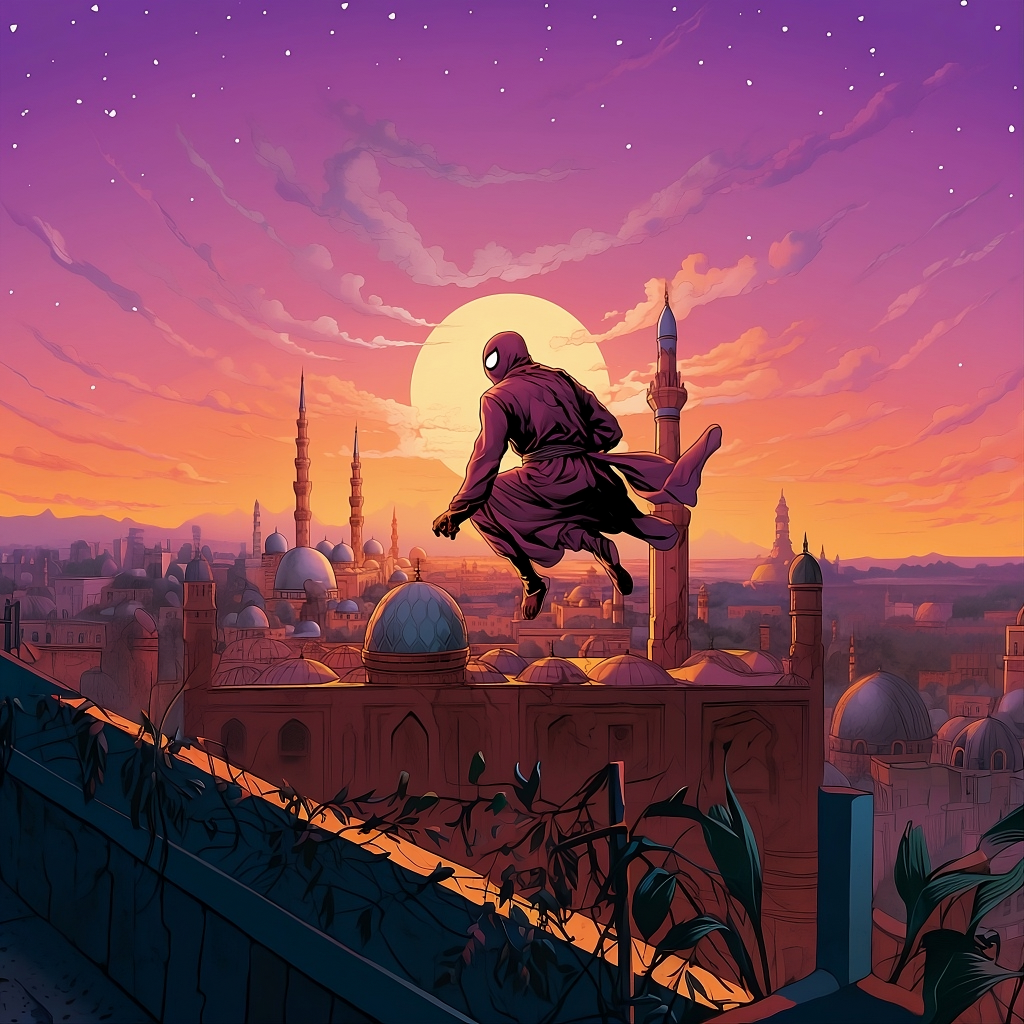
A Great Task
A clear distinction exists between information and knowledge. The former represents a refined data set that can be interpreted and comprehended, and as for the latter, definitions of knowledge may vary. In the context of this digital era, it embodies the actualisation of data, intuition, experience, and belief as an integrated whole. Through this process of actualisation, a Muslim is challenged with the task of finding al-haq (The Truth). This article discusses the necessity to pursue al-haq in an era of misinformation while using powerful and contemporary AI platforms such as ChatGPT (Chat Generative Pre-Trained Transformer).
It is not an exaggeration that the exposure to information in this modern era is substantial, as 90% of data from all of time was collected, compiled and exposed digitally in just two years from 2013. And it’s only growing.
Allah The Almighty said: “In the End of Times, I will spread out knowledge, such that every man and woman will know it, every slave and free person will know it, and every young and old will know it. Once I have done that with them, I will take them to task on account of My right over them.”
Allah SWT challenges anyone to find any irregularity and disproportion in the system of His creation, as there is none. In that challenge, all of mankind is put to task in being inquisitive for a single purpose, which is to seek and find al-haq.

ثُمَّ ارۡجِعِ الۡبَصَرَ کَرَّتَیۡنِ یَنۡقَلِبۡ اِلَیۡکَ الۡبَصَرُ خَاسِئًا وَّ ہُوَ حَسِیۡرٌ
Look around time and again with (an inquisitive) vision (from different angles and with scientific methods. Every time) your sight will return to you fatigued and frustrated (in finding any shortcoming or imperfection).
(Qur’an 67:4)
With the introduction of generative artificial intelligence platforms like ChatGPT, the level of access to widespread information is unprecedented and nearly incalculable. Humanity is now equipped with more information than ever and is assigned a great task to find truth and expand one’s own knowledge for the sake of Allah SWT.
The Modern-Day Toolkit
Acquiring essential digital literacy to discern information from misinformation and transform it into meaningful knowledge requires an understanding of the tools that are now at one’s disposal. Consequently, a conscientious utilisation of these tools becomes critical, not only to enhance personal knowledge but also to foster a culture of responsible and purposeful use of online resources in future generations.
In recent events, Artificial Intelligence has emerged as a prominent subject of interest across the globe. Eric Neiller from the Wall Street Journal recounts that AI has a relatively long history, beginning as a statistical approach to computer-based decision-making. Over the course of its development, AI has undergone significant transformations. It is now encompassing any technology capable of reasoning, learning, planning, and making decisions, tasks that are typically associated with human intelligence. However, AI enables these activities to be performed by entities other than humans, thus earning its label as Artificial Intelligence.
In the particular case of generative AI, many platforms are gaining rapid attention, such as ChatGPT by OpenAI, heralded to have become “among the fastest-adopted technologies of the Internet era.” ChatGPT is an AI chatbot that utilises a family of large language models (LLM) to predict “the next most likely word in a sentence based on a prompt and previous chat history.” In more discernible terms, the platform allows a user to ask questions, and request a task to be completed.
The Holy Prophet ﷺ commanded Muslims to “seek knowledge as far as China”.2 The Prophetic imperative seeks to encourage Muslims to travel to distant lands in order to inherit knowledge and commit to the path of learning. The purpose of this command is to emphasise the importance of cross-civilisational learning and absorbing traditions from various cultures, traditions, and people. Muslim thought must not be parochial and narrow. Instead, this Prophetic command underlines the importance of being diverse, vast, and encompassing of numerous intellectual traditions.
“Allah desires ease for you and does not desire hardship for you…” (Qur’an 2:185)
With tools like these at one’s fingertips, there is ease and convenience in many tasks, such as compiling research, answering elaborate questions, and completing copy-related work. As a Muslim, one is encouraged to take the simple route, but oftentimes this is misinterpreted as being negligent. Just as one should understand the benefits of using certain tools, the limitations and barriers of use should also be understood so as not to be led astray.

Limitations of the Modern-Day Toolkit
In the cases of search engines like Google, users can sift through information for relevant and trustworthy sources. However, in the case of an LLM software like ChatGPT, it reaches into a wide range of publicly available sources that were only last updated in September 2021. Since the platform is not internet-connected, it is not grabbing information retroactively and giving accurate to-date answers. The Journal of International Affairs states that “it could not fact-check itself, leading ChatGPT-supported applications to ‘hallucinate’—generate plausible-sounding yet factually inaccurate information in response to verifiable questions.” This information, although disappointing, does not take away from the overall impressive functional use that ChatGPT provides. Rather, it garners caution when accessing such a powerful tool, especially when seeking information about theology and Islam.

Input Determines Output
Considering the tools that humanity has access to for gathering information, it is imperative that a responsible practice is fostered to filter information from misinformation. While technologies like ChatGPT provide general information, there is always a need to approach subject-matter experts on Islam-related matters to comprehend the information (attain knowledge).
Generative AI platforms are programmed to receive prompts and respond with relevant and developed responses. Professor Stuart J. Russell OBE of the University of California is an expert in AI systems and has worked with the WEF (World Economic Forum) to define the depth of use with generative AIs. He defines the fundamental use of AI to be objective-oriented. Where real human intelligence can consider circumstantial information while making decisions, AI is not able to. If one would give a human the task of resolving marital disputes, they would consider all the social-related factors and develop an apt response. Whereas, when asking ChatGPT, “How do I resolve issues with my spouse?”, it gave the generic response of “Open and honest communication is the foundation of any successful relationship.” This prompt lacks the subjective nature of the issue, necessitating a more comprehensive approach. With many complex problems, where does the balance lie between AI’s analytical capabilities and human judgment? And with numerous external and internal factors at play, should AI be relied upon for comprehensive opinions or used solely to extract relevant information?
Finding Truth

اِہۡدِ نَا الصِّرَاطَ الۡمُسۡتَقِیۡمَ ۙ﴿۵﴾ صِرَاطَ الَّذِیۡنَ اَنۡعَمۡتَ عَلَیۡہِمۡ ۙ۬
“Show us the straight path, The path of those upon whom You have bestowed Your favours,” (Qur’an 1:5-6)
In Islam, the concept of al-haq (The Truth) represents an objective reality and a definitive path that adherents must diligently seek and follow. Shaykh-ul-Islam Dr. Muhammad Tahir-ul-Qadri states, “It is clear human beings do not travel in a vacuum. A journey presupposes a destination and the destination involves a sense of direction.” The right path can be reached from many different avenues, which raises the question of subjectivity. Shaykh-ul-Islam elaborates in that case, “Man needs the right sense of direction to reach the specific end or to realise his coveted goal.” This would mean that the right sense of direction is a product of making correct decisions through the knowledge shared in Islam. This path will be challenging and many times proves one incorrect. But, to stay diligent in finding answers, seeking divine knowledge and finding al-haq is the test and duty of all of humanity.
In Islam, indisputable truths exist through divine knowledge: the Noble Quran and the prophetic traditions. Allah SWT commands, “O believers! Obey Allah and obey the Messenger (blessings and peace be upon him)” (Qur’an 4:59). With divine knowledge accessible universally, all that is left is interpretations for changing times. The interpretation of divine knowledge and its application are then implemented in this day and age by “those (men of truth) who hold command amongst you…” (Qur’an 4:59). In the case of modern AI, interpretation and comprehension are practises that lie beyond what LLM platforms are currently engineered to do. Therefore, they should not be consulted for opinions, but rather a source to extrapolate information.
In the case of ChatGPT, it does contain and store information that is divinely attributed, which is where a more detailed prompt would be useful. Once asked, “How would I resolve issues arguing with my spouse with consideration from the Quran and Sunnah?”, it replied with referenced information: “Communication with Kindness: The Quran encourages believers to speak with kindness and gentleness (Surah Al-Baqarah 2:83).” With this information, one is then enabled to find the referenced piece, understand and comprehend it through more traditional avenues of learning.
Humanity is challenged daily to react to unique circumstances and challenges, which enables us to research and comprehend divine knowledge for self-guidance. Since AI is artificial in nature and does not possess the option to react to ongoing issues, it does not seek growth through a greater purpose. AI is limited by its function of being objective-oriented. However, one can argue that the neural networks in which AI learns and ties together information semantically can layer information and draw relevant connections. Unfortunately, the answers that generative AI programs introduce will still not be comprehensive, all-inclusive and complete with global knowledge and belief systems. This is the insurmountable gap between an artificial intelligence form and humanity.
This further emphasises the need for guidance in the disciplines of Islam; there are no shortcuts to ascension in ‘Ilm (Knowledge) and spirituality. Albeit technology is deemed to be a shortcut to many functions of our daily life cycle, this is one area where it has not been proven to prevail.

Bias and an Information Gap
Generative AI can be extensively useful as an alternative to querying subjects, topics and issues in the context of religious understanding. However, there exist information gaps and biases in every LLM training data set: “Training data refers to the initial data that is used to develop a machine learning model, from which the model creates and refines its rules.” Since AI platforms are recycling data within a data set and learning from it, there exists a high risk of amplifying unwanted biases. Oftentimes the LLM scrapes online data that is largely English language content, and this presents the risks of receiving misleading and biased opinions while ignoring datasets of diverse language content. Throughout the history of Islam, it is without question that the accumulation of knowledge resources appears in historically diverse language groups such as Arabic, Persian, Urdu and Turkish. Islam has impacted over 2300 language and ethnic subgroups globally, and many of those over Islam’s rich 1400-year-old history have produced knowledge resources. Furthermore, relevant LLM softwares like ChatGPT have only gathered training data circulating in the Western hemisphere, meaning it would be more biased to “Western belief systems and unexposed to the global body of knowledge”. This highlights the necessity to exercise caution when digesting potentially biased information and data.
The Inevitable Future12 Although many prefer traditional forms of learning knowledge, through books and literature, there exists an inevitable transition to digitised information and knowledge resources. This is especially the case for younger generations that are coined to be digital natives. They are accessing all forms of media for entertainment and active or inactive learning, which is exposing them to unfiltered information.
To nurture posterity and encourage growth, adults are tasked to learn digital literacy. Researchers of early childhood education have found a positive correlation between adult mediation and children’s use of technology when “adults provided them with a safe climate, encouraged them to participate in conversation, involved them in establishing the goals of the activity, and maintained their interaction with the adults and with the technology.” Therefore, learning the limitations and uses of modern technologies is imperative not only for adults but for nurturing future generations of Muslims.
Seeking elements of truth through generative AI technologies should be limited in practice to only extrapolating relevant information, and one should continue following traditional sources of knowledge. In a rapidly advancing technological landscape, it is imperative for Muslims to remain diligent and conscious of how these technologies can influence the great task of finding al-haq. To demonstrate the capability of accessible AI, it would be fitting to summarise the contents of this article using ChatGPT.
“The beauty of Islam lies in its ability to adapt to contemporary challenges while staying true to its divine principles. In this age of technological advancements, Muslims are urged to approach AI tools, like ChatGPT, with mindfulness and caution in their pursuit of knowledge. Crafting comprehensive prompts that draw upon references from the Quran and Sunnah, and seeking guidance from traditional knowledge sources becomes essential. To ensure a balanced approach, cultivating a critical mindset while utilising digital tools for knowledge acquisition is of utmost importance. While AI platforms can be valuable aids, they should never replace active learning from traditionally diverse and reliable sources. As Muslims embrace the opportunities presented by the digital era, one can blend modern digital literacy with timeless Islamic wisdom. By doing so, one can genuinely seek truth and expand knowledge, all for the sake of Allah SWT.”
With the great task of seeking al-haq at hand and many tools at one’s disposal, the famous pop culture reference to Uncle Ben in Spiderman – “with great power comes great responsibility” – is more applicable now than ever. Spiderman realises the corruptive nature of great power; the question is, do people of today realise this as well? Don’t let the changes of this evolving era be a means to become negligent, but instead, become the modern-day hero for Islam and generations to come.

1 Abdulrazzak Patel, The Arab Nahdah The Making of the Intellectual and Humanist Movement, (Edinburgh University Press, 2013).
2 Transmitted by Imam al-Bayhaqi in Shu’ab al-Iman.
3 Yoav Di-Capua, Chapter Three: Nahda: The Arab project of enlightenment, in: The Cambridge Companion to Modern Arab Culture, edited by Dwight F. Reynolds, (Cambridge Universe Press, 2015), pg. 55.
4 Stephen Andersen and Durwood Zaelke, Aviation Partners The future is on the wing, (Routledge, 2003), pg. 32.
5 Ibid.
6 The City in the Islamic World, Volume One, special editors: Renata Holod, Attlio Petruccioli and Andre Raymond, and edited by H Altenmuller, B. Hrouda, B. A. Levine, R. S. O’Fahey, K. R. Veenhof, C. H. M. Versteegh, Handbook of Oriental Studies, Section 1, The Near and Middle East, (Brill, 2008), pg. 225-226.
7 Jonathan Lyons, The House of Wisdom How the Arabs Transformed Western Civilisation, (Bloomsbury Publishing, 2010).
8 The City, 236.
9 Ibid, 236-237.
10 Shaykh-ul-Islam Dr. Muhammad Tahir-ul-Qadri, The Constitution of Madinah: The First Constitution in Human History, 1999.
11 Ethan L. Menchinger, The First of the Modern Ottomans The Intellectual History of Ahmad Vasif, (Cambridge University Press, 2017), pg. 3-6.
12 The Grand Mufti, who was also known as the Shaykh-ul-Islam in the Ottoman Empire. This was an official post.
13 Ahmed Seyhun, Islamist Thinkers in the Late Ottoman Empire and Early Turkish Republic, (Brill, 2014), pg. 178-179.
14 Metin M. Cosgel, Thomas J. Miceli, and Jared Rubin, The political economy of mass printing: Legitimacy and technological change in the Ottoman Empire, Journal of Comparative Economics, Vol. 40 (3), 2012, Pg. 363.
15 Paul M. Kennedy, The Rise and Fall of the Great Powers, (William Collins, 2017).
16 Jense Hanssen and Max Weiss, Arab Thought Beyond the Liberal Age: Towards an Intellectual History of the Nahda, (Princeton University Press, 2017), pg. 235.
17 Stanford J. Shaw, Studies in Ottoman and Turkish History Life with the Ottomans, (Gorgias Press, 2011), pg. 62.
18 Yonca Koksal, The Ottoman Empire in the Tanzimat Era Provincial Perspectives from Ankara to Edirne, (Routledge, 2019), pg. 4-6.
19 Hanssen and Weiss, 8.
20 Ibid, 246. The Arab-Ottoman Synthesis.
21 Peter Hill, Utopia and Civilisation in the Arab Nahda, Chapter Four: An Arabian Utopian, (Cambridge University Press, 2019), pg. 208.
22 Hill, 208-209.
23 Naoemi Levy-Aksu and Francois Georgeon, The Young Turk Revolution and the Ottoman Empire: The Aftermath of 1908, (I. B. Tauris & Company, 2017), pg. 41-43.
24 Ali Allawi, Chapter One: Pathways to Modern Islam, in: Pathways to Contemporary Islam New Trends in Critical Engagement,
edited by Mohamed Nawab and Mohamed Osman, (Amsterdam University Press, 2020), pg. 32.
25 Alawi, 32-33.
26 Alawi, 46.
27 Ibid, 47.
28 Iulia Lumina, Chapter Two: A Theoretical Pathway to Contemporary Islam, in: Pathways to Contemporary Islam New Trends in Critical Engagement, edited by Mohamed Nawab and Mohamed Osman, (Amsterdam University Press, 2020), pg. 52.
29 Lumina, 59-60.
30 Ibid, 60.
31 Ali Unsal, Chapter Three: A New Approach to Islamic Intellectual Tradition, in: Pathways to Contemporary Islam New Trends in Critical Engagement, edited by Mohamed Nawab and Mohamed Osman, (Amsterdam University Press, 2020), pg. 88.